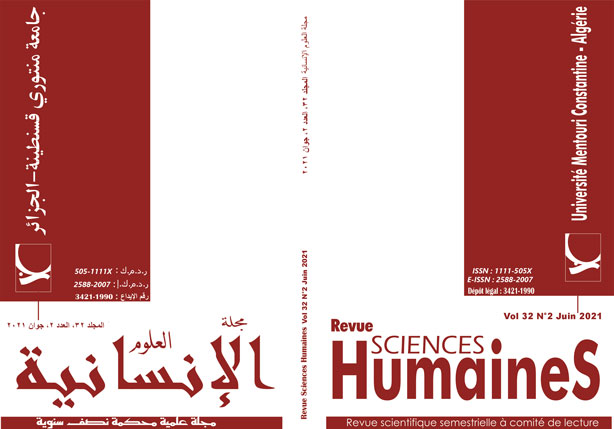Perceiving Ben O’kri’s The Famished Road: The Role of Postcolonial Hybridity
Mots-clés :
The Famished Road, Hybridité, Postcolonialisme, Culture Africaine, postmodernisme, PolitiqueRésumé
The Famished Road de Ben O’kri est un roman de Realisme Magique qui donne de la crédibilité à l’idée de parler aux morts. Un mort qui parle n'est pas un nouveau concept dans la culture africaine car l'enfant qui revient à la vie dans un autre corps est une notion largement acceptée. En tant que romancier nigérian, Ben Okri utilise Azoro ou Abiku comme personnage principal qui vit en réalité avec sa famille mais qui vient à l'origine du monde immortel. Représentant cette scène, la majorité des critiques pensent qu'Okri est influencé par la culture nigériane, alors qu'il utilise ce type de réalisme animiste sur une base postcoloniale. Okri compte sur l'hybridité de la culture nigériane actuelle pour percevoir le message politique visé par The Famished Road. Les lecteurs nigérians ne sont pas obligés de suspendre volontairement leur incrédulité; cependant, il leur est demandé d'utiliser leur imagination, issue de l'influence coloniale et africaine, pour concevoir le message.
Téléchargements
Références
. Achebe, C. C. (1980). Literary Insights into the" Ogbanje" Phenomenon. Journal of African Studies, 7(1), 31.
. Allolio-Nack, Lars. (2014) “Hybridity.” Encyclopedia of Critical Psychology.Jan 2020. Pdf.
. Baloyi, L., & Makobe-Rabothata, M. (2014). The African conception of death: A cultural implication.
. BonJour, L. (1985). The structure of empirical knowledge. Harvard University Press.
. Washington, B. T., & Loram, C. T. (1971). Up from slavery: an autobiography. Corner House.
. Carroll J. (2019) Death in Literature. In: Shackelford T., Zeigler-Hill V. (eds) Evolutionary Perspectives on Death. Evolutionary Psychology. Springer, Cham. https://doi.org/10.1007/978-3-030-25466-7_7a
. Clasen, M., Kjeldgaard-Christiansen, J., & Johnson, J. A. (2018). Horror, personality, and threat simulation: A survey on the psychology of scary media. Evolutionary Behavioral Sciences. https://doi.org/10.1037/ebs0000152
. Dunn, R. G. (1998). Identity crises: A social critique of postmodernity. U of Minnesota Press.
. Holland, J. (1988). A postmodern vision of spirituality and society. Spirituality and society: Postmodern visions, 41-61.
. Godiwala, D. (2007). Postcolonial desire: Mimicry, hegemony, hybridity. In Reconstructing Hybridity (pp. 59-79). Brill Rodopi.
. Jiménez-Gómez, A., & Munjuluri, S. (2019). Culture-Bound Syndromes During Pregnancy and Early Childhood. In Clinical Handbook of Transcultural Infant Mental Health (pp. 259-271). Springer, Cham.
. King, L. M. (2013). In discourse-toward a Pan-African psychology: DRUM rolls for a psychology of emancipation. Journal of Black psychology, 39(3), 223-231.
. Maclean, U. (1971). Magical medicine. A Nigerian case-study. Magical medicine. A Nigerian case-study.
. Nederveen, P. J. (2004). Globalization and culture: Global mélange. New York: Kowman & uttieneia Publishers.
. Okri, B. (1992). The Famished Road. New York: Talese.
. Ouma, C. E. (2020). Diaspora Childhoods: Creating Sublimated Connections. In Childhood in Contemporary Diasporic African Literature (pp. 141-182). Palgrave Macmillan, Cham.
. Pratt, D. W. (2019). The Celebration of Death in Contemporary Culture.
. Southgate, M. T. (2005). Healing of Abiku Children. JAMA, 294(13), 1591-1591.
. Tacey, D. (2012). Contemporary spirituality. The Oxford textbook of spirituality in healthcare, 473-479.
. Tuzet, G. (2020). ‘Suspension of Disbelief’: A Coherentist Theory of Fiction. International Journal for the Semiotics of Law-Revue internationale de Sémiotique juridique, 1-24.
Téléchargements
Publié-e
Comment citer
Numéro
Rubrique
Licence

Cette œuvre est sous licence Creative Commons Attribution - Pas d'Utilisation Commerciale - Partage dans les Mêmes Conditions 4.0 International.

















